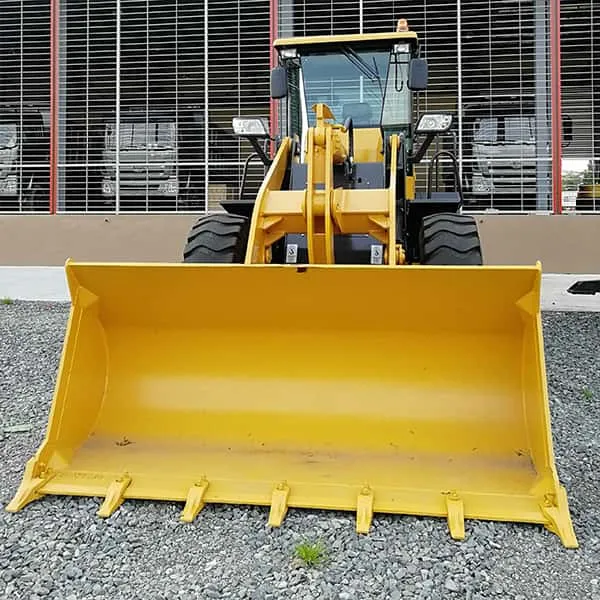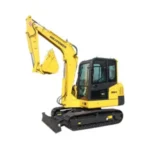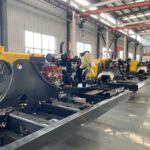Introduction
In the world of heavy machinery, wheel loaders play a crucial role in various industries, from construction to mining. Securing a great wheel loader sale involves more than just finding a machine that fits your needs; it requires strategic planning, knowledge, and a clear understanding of what to look for. This guide will provide expert tips on how to navigate the wheel loader market and ensure you make a well-informed purchase.
Compréhension Chargeuses sur pneus

Before diving into the specifics of securing a sale, it’s essential to understand what wheel loaders are and their primary functions. Wheel loaders are versatile machines used for loading materials, transporting them across short distances, and performing other tasks. They come in various sizes and capacities, each designed to meet specific operational requirements.
Key Functions of Wheel Loaders:
- Loading and transporting materials
- Excavating and grading
- Material handling in various environments
Understanding these functions helps buyers determine what type of wheel loader best suits their needs.
Key Considerations When Buying a Chargeuse sur pneus
Securing a great wheel loader sale involves several critical considerations:
Determine Your Requirements
Assess your operational needs to determine the specifications and features required for your wheel loader. Consider the following factors:
- Bucket Capacity: The size of the bucket should match the volume of material you need to handle.
- Operating Weight: Ensure the loader’s weight is adequate for stability and performance.
- Lift Height and Reach: Depending on your tasks, you might need a loader with specific lift height and reach capabilities.
Evaluate Machine Specifications
Once you’ve determined your requirements, compare the specifications of different wheel loaders. Create a checklist of essential features and ensure the machines you’re considering meet these criteria.
Example Specification Checklist:
| Fonctionnalité | Description | Importance |
|---|---|---|
| Engine Power | Measures the engine’s horsepower. | Higher power for more demanding tasks. |
| Hydraulic System | Determines the efficiency of lifting and loading. | Essential for smooth operation. |
| Transmission Type | Includes manual, automatic, or CVT. | Affects ease of use and efficiency. |
| Tire Size | Impacts traction and stability. | Choose based on terrain and load. |
Research Market Prices
Market prices for wheel loaders can vary based on brand, model, and features. Conduct thorough research to understand the average market price for the type of wheel loader you are interested in. Comparing prices will help you identify a good deal and avoid overpaying.
Financing Options for Chargeuses sur pneus

Securing a great wheel loader sale may also involve exploring financing options. Here are some common methods:
- Leasing: Ideal for businesses that need flexibility. Leasing allows you to use the wheel loader without a large upfront cost.
- Loans: Traditional financing through banks or financial institutions. Loans can help you spread the cost over time.
- Rent-to-Own: This option allows you to rent the wheel loader with the possibility of purchasing it later.
Each financing option has its pros and cons. Consider your financial situation and operational needs to choose the best option.
Inspection and Testing
Before finalizing the sale, inspect and test the wheel loader to ensure it meets your expectations. Here’s what to check:
- Visual Inspection: Look for any signs of wear and tear, damage, or corrosion.
- Operational Test: Test the loader’s functionality, including lifting, loading, and maneuvering.
- Maintenance History: Review the machine’s maintenance records to ensure it has been properly serviced.
Conclusion
Securing a great wheel loader sale requires a combination of understanding your needs, evaluating machine specifications, researching market prices, exploring financing options, and conducting thorough inspections. By following these expert tips, you can make an informed decision and invest in a wheel loader that will serve your operational needs effectively.
FAQ
Q1: What should I consider first when looking to buy a chargeuse sur pneus?
A1: Begin by assessing your specific needs, including bucket capacity, operating weight, lift height, and reach. This will help you narrow down your options.
Q2: How can I determine if a wheel loader is priced fairly?
A2: Research market prices for similar models and compare them with the price offered. Consider the machine’s specifications and condition as well.
Q3: What are the advantages of leasing a chargeuse sur pneus?
A3: Leasing provides flexibility, lower upfront costs, and the ability to upgrade to newer models without the burden of ownership.
Q4: Why is it important to inspect and test a wheel loader before purchase?
A4: Inspection and testing ensure the machine is in good condition and meets your operational requirements, preventing potential issues after purchase.
Q5: Can I negotiate the price of a chargeuse sur pneus?
A5: Yes, negotiating the price is common. Use your research and market knowledge to negotiate a fair deal.







-150x150.webp)
